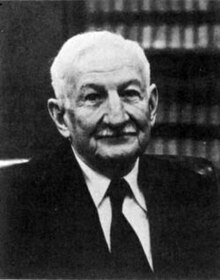Charles Fahy
| Charles Fahy | |
|---|---|
 |
|
| Judge of the United States Court of Appeals for the District of Columbia Circuit | |
|
In office April 7, 1950 – April 17, 1967 |
|
| Nominated by | Harry S. Truman |
| Preceded by | Seat established |
| Succeeded by | George MacKinnon |
| 26th Solicitor General of the United States | |
|
In office November 1, 1941 – September 1945 |
|
| Appointed by | Franklin Roosevelt |
| Preceded by | Francis Biddle |
| Succeeded by | J. Howard McGrath |
| Personal details | |
| Born |
Charles Fahy August 17, 1892 Rome, Georgia |
| Died | September 17, 1979 (aged 87) Washington, D.C |
| Spouse(s) | Mary Agnes Lane |
| Alma mater |
Notre Dame (A.B.) 1912 Georgetown University Law School (LL.B. )1914 |
Charles Fahy (August 27, 1892 – September 17, 1979) served as Solicitor General of the United States and later as a United States federal judge on the United States Court of Appeals for the District of Columbia Circuit.
Born in Rome, Georgia, Fahy was the son of Thomas and Sarah (Jonas) Fahy. Charles attended the University of Notre Dame and then went to Georgetown University Law School. There he received his LL.B. in 1914 and was admitted to the D.C. bar in the same year. He served the United States in World War I as a naval aviator attached to the British and American forces. Fahy was awarded the Navy Cross. After the war he returned to Washington, D.C. and practiced law until 1924, before moving his practice to Santa Fe, New Mexico, where he resided until 1933. While in Sante Fe, Fahy served as the city attorney in 1932.
In 1933, Fahy returned to Washington when he was appointed first assistant solicitor to the Department of the Interior. The same year, he was appointed as a member of the Petroleum Administrative Board, and then served as its president from 1934-1935. As general counsel of the National Labor Relations Board from 1935–1940, Fahy began his career in Supreme Court litigation on behalf of labor rights. Upon the enactment of the Wagner Act in 1935, Fahy, on behalf of the NLRB, often appeared in front of both Houses of Congress to offer testimony and litigated cases in the Supreme Court brought against the government. By the time he was appointed assistant solicitor general in 1940, Fahy had already appeared eighteen times in front of the Supreme Court, where his arguments were wholly sustained sixteen times and partially upheld twice.
...
Wikipedia
